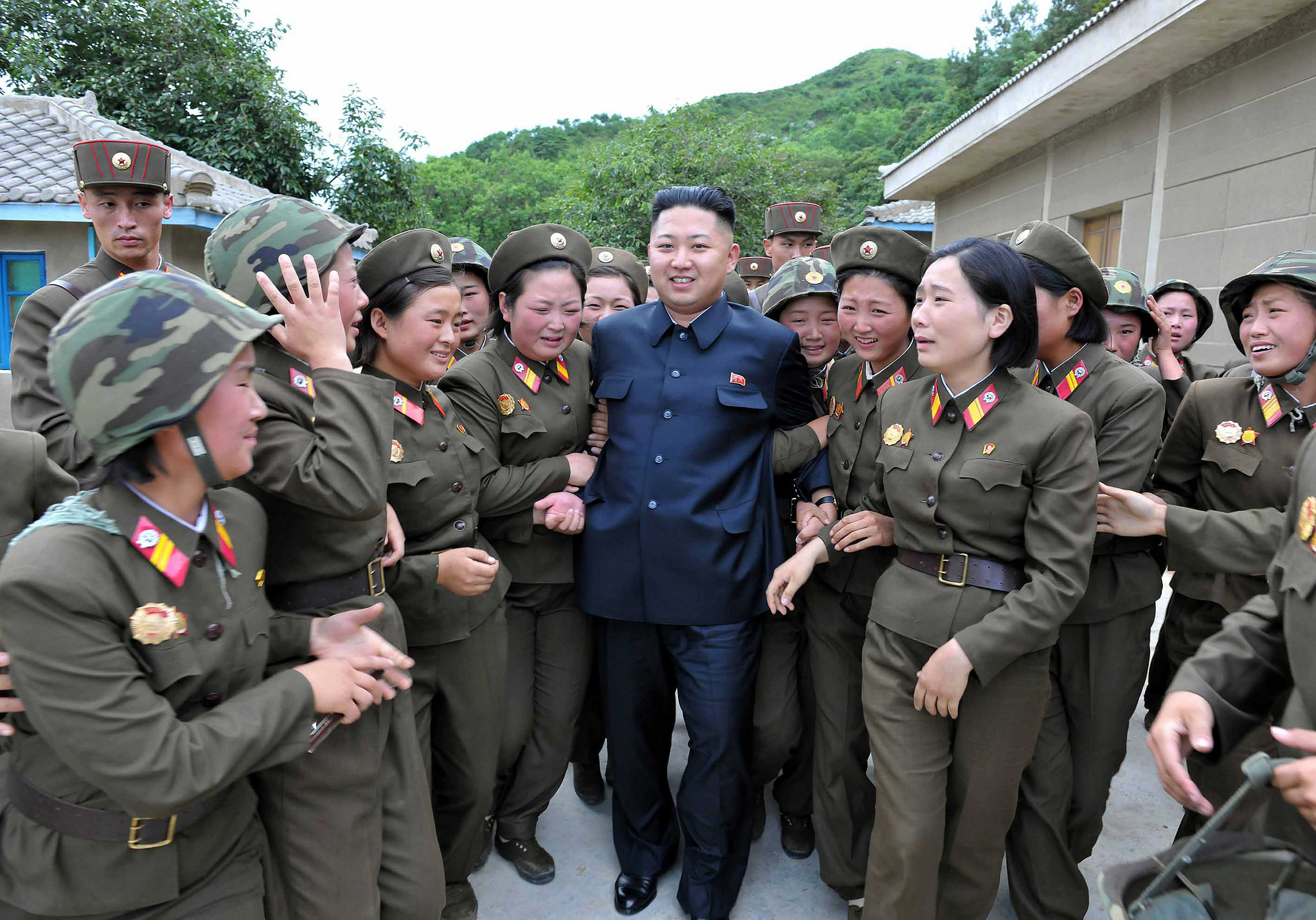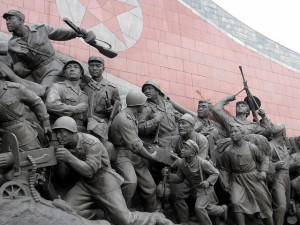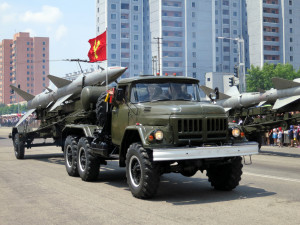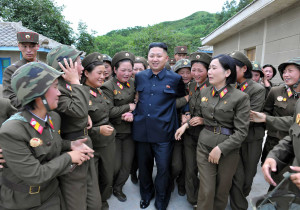With Friends Like These: North Korea’s Nuclear Test and China’s Growing Concerns
 Kim Jong-Un visits the Revolutionary Persimmon Tree in 2012. https://flic.kr/p/Q8zWV2
Kim Jong-Un visits the Revolutionary Persimmon Tree in 2012. https://flic.kr/p/Q8zWV2
China and North Korea are two states bound by geography and politics. Since the division of South and North Korea and the rise of the Kim dynasty, China has been the latter’s erstwhile supporter. At times this motivated passionate aid in men and resources, and at other times a begrudging Security Council veto in favour of the rogue state. For a state which in the face of all judgement against it has continued to survive for over sixty years, the future appears to as ever balance on the narrowest of fulcrums.
Why China Continues to Support North Korea
China and North Korea’s relationship is rocky, but overall consistent. The two states emerged in the same era of post-WWII political readjustment. Both were communist-authoritarian states, and both developed a personality cult around their respective leaders Mao Zedong and Kim Il-Song. Both North Korea and China went through long periods of limited contact with outside states, which is especially true of North Korea. China was the first to come to North Korea’s aid after North Korea’s invasion of the South, a war in which Mao’s own son died.
However, the ties which bind in the modern day are much less ideological and much more geo-strategic in nature. China has a knee-jerk reaction to insecurity in the north. Nearly every overthrow of Chinese dynasties (which weren’t internal) came from northern foreigners, or from those who had gained hegemon first in the north before moving South. Despite the Great Wall, the Mongols (who would later take the name the Yuan Dynasty) successfully invaded and destroyed the Song Dynasty in the 13th century. The Ming Dynasty, already suffering from severe internal divisions, suffered a death blow in the form of invading north Jurchen, or Manchus who then took control of China as the Qing Dynasty in 1644. Similarly, Japan first invaded Korea and then moved into Manchuria attacking one war lord after another before descending on China. China may not be happy about having such a dangerous, recalcitrant, and foolhardy neighbour, but China has always selected the devil they know in place of the far more frightening idea of insecurity.

Insecurity is precisely what would most likely result from international movements which can cause the fall of the Kims. China would likely face a refugee crisis of North Koreans flooding their borders. Most worrisome of all, if Korea, following the downfall of the Kims, were to by chance of fate become reunited under the South Korean administration, China would suddenly have a state, with very close ties to the United States right at their most sensitive border. Until North Korean behaviour poses a greater danger than this scenario to domestic Chinese concerns, China will not want to push the regime to the brink. The critical question of course becomes where is this threshold, when does North Korean nuclear and missile testing, chemical and biological weapons hoarding, and braggadocios leadership prove too much, and what will China do?
The Threshold
This past year has certainly put the North Korean-Chinese relationship to the test and if the first three months are anything to go by, 2017 will see only an increase in tensions between the two authoritarian states.
The Six-Party-Talks broke down over the past few years, particularly since 2012. And despite outside pressure and sanctions, North Korea has by and large avoided mending fences. In February 2016 North Korea launched a long range missile in an attempt to place a satellite in space. However, the purported motivation is highly suspicious considering that if the only goal had been to place a satellite, they could have paid China to do so at a much lower cost. Instead, the satellite launch was in reality a missile test, and Washington, Tokyo, and Seoul reacted strongly. China stated at the time that it “regrets” North Korea’s actions but cautions “the relevant parties” to “refrain from taking actions that may further escalate tensions on the Korean peninsula”.

This test came one month after North Korea’s alleged hydrogen bomb test. Outside analysts find the claim that it was a hydrogen bomb, which is much stronger than a regular nuclear bomb, to be very doubtful. The success of the test was itself in doubt. However, by September North Korea had successfully tested a nuclear warhead. These latter tests faced a much harsher Chinese response. In the weeks before Donald Trump became president of the United States, he tweeted about North Korea’s nuclear future, saying “[i]t won’t happen”. Following the September test, China voted to pass a series of sanctions on North Korea. However, they stipulated that an exception must remain to allow for trade that is for the betterment of the North Korean people. With this caveat in hand, China continued to trade, although more covertly, with its neighbour.
However, 2017 is already showing a significant change in relations. China’s ball-and-chain has become heavier since the new year as North has now conducted its fifth nuclear test (February 23) and a missile launch (March 6). The missile launch went farther than previous practices and landed less than 300 kilometres from the Japanese coast into Japanese EEZ waters. Following the February test, which measured as a 5.5 earthquake and was the largest to date, China ceased all trade in coal. Coal had been the major product which China continued to sell to North Korea in the past, and the change in policy is significant.

Outside of the realm of weapons testing, North Korea’s leader, Kim Jong-Un has further increased tensions between the two countries by first executing his uncle and then likely being the hand behind the assassination of his half-brother in Malaysia in February, 2017. The latter had been a relative political moderate and had resided predominantly in Macau under nominal Chinese protection. His assassination was a slap in the face to China. It is likely that Kim Jong-Un considered his brother, Kim Jong-Nam, a political threat. The Chinese could have potentially used his brother as a replacement for him, or as the stability mainstay in a plot to overthrow him. By removing his uncle and brother, Kim Jong-Un is eliminating other alternatives to the Kim regime that could provide a more stable peninsula for China. However, one must wonder how, if Kim Jong-Nam was such a critical player for the Chinese he would be allowed to travel so independently without security so that two young women could approach him and spray two different compounds into his eyes without a fight of any kind.
North Korea, of course, denies such allegations and contests that a chemical weapon, VX nerve gas was the poison used. They maintain that if it was a chemical weapons both of the young women would now be dead, but VX nerve gas is a binary composition that can be kept separately safely and only once combined will it have an effect.
Breaking Point
Increased US presence and action in the peninsula is a disconcerting prospect for leadership in Beijing. Beijing has consistently opposed the THAAD missile system, and has historically levied more blame on the United States for the status of relations. However, North Korea’s growing nuclear weapons program is a cause of intense concern, for both the United states and China. Beyond the fact that it would mean the possession of weapons of mass destruction by a regime that is not known for its rational, safe foreign policy, North Korea which as always been poor might consider selling the individual war heads to third parties. Considering that China has recently made the ISIS threat list, this should be an additional cause of concern for Chinese leadership. China would certainly not want intervention in the peninsula by the United States. And if there were to be any joint action it would take a lot more trust between the United States and China than they currently possess.
North Korea is certainly testing the outside community and none more than China. Many of the missile and nuclear tests have coincidentally taken place on days China was hosting large conferences, such as the G-20 summit in Hangzhou. They are pushing the line on domestic politics, weaponry practice, and very importantly, their respect for China. In addition to the alleged, audacious assassination and the determined flouting of nuclear and missile restrictions, North Korea has also been aggravating the tension through propaganda and insults. In late 2016, the North Korean press accused China of being a “great power chauvinist”, and said that China now “dances to America’s tune”. The question remains whether Kim is spelling his own doom, and this the writing on the walls, or he is rather making a point that despite what he may do in the rest of his life, China can do very little about it.
